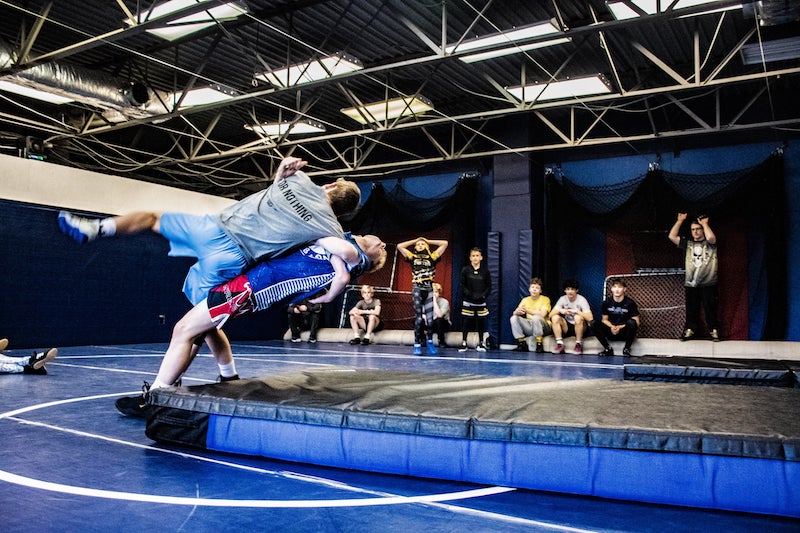FREQUENTLY ASKED QUESTIONS
What sets NOVA apart from other wrestling clubs?
- Our coaches are certified. All coaches are Copper and Bronze Certified through USA Wrestling.
- We have our own independent training complex. We don’t train out of a high school. This means we don’t have to worry about logistical conflicts. We have a high degree of flexibility in our scheduling and the training options we provide.
- We are community-oriented. We believe that wrestling is better when its grounded in community. We have partnerships with local organizations including The Eric Monday Foundation, the Conner Strong Foundation, Wrestling Mindset and LuchaFit. We’re able to provide a plethora of unique opportunities to our wrestlers and families because of these partnerships.
- We offer differentiated programs. We don’t have a “one size fits all” approach. We offer programs for all ages and abilities, so no one is grouped together for efficiency reasons.
- We prioritize retention. We believe that retaining wrestlers is critical to them having a long and successful career in our sport. Our competition and training philosophy is designed to promote sustainable growth.
How do I join NOVA?
We encourage all wrestlers to try a practice out to make sure NOVA is a good fit for you. Once you’re sure it’s a good fit, simply go to our “Join” page sign up. Click here to get started.
What age groups can train at NOVA?
Wrestlers can start in our Little Hammers Champions program as early as age 4 (2-days a week in summer). We train elementary, middle and high school wrestlers. We also train senior level wrestlers for national and international events in our elite program. Middle and high school wrestlers with national Freestyle & Greco-Roman credentials are eligible to train in our elite group.
What is your philosophy on competition?
Per USA Wrestling’s Athlete Developmental Model, competing in the sport too early can be detrimental to a wrestler’s longevity in the sport. We do not require that our youth wrestlers compete in tournaments. We believe the ideal age to start competing is between 10 and 13 years of age. We believe that a kid should compete when he or she is psychologically and physically ready. This can be determined by the wrestler, parents, and coaches.
What tournaments do your wrestlers compete in?
We are constantly evaluating opportunities to get our wrestlers competitive matches. With that in mind, our competition schedule in the spring, summer, and fall months is fluid. Our winter competition schedule is set in November. Our current (tentative) schedule can be found on our Calendar page. We attend our local Mason Dixon League, Tyrant Wrestling, Virginia Wrestling Association (VAWA) and USA Wrestling.Check this regularly and stay tuned for email updates.
My child wants to wrestle in college. What can you do to help him or her achieve that goal?
First, it needs to be recognized that your athlete will be the one who makes this happen. Being a college wrestler takes a lot more than being a good wrestler. Your athlete will need to excel on and off the mat, especially in the classroom.
Our goal is 100 percent college/military/trade school placement annually. We understand that not all of our wrestlers will compete at the next level; however, we place a strong emphasis on the competitive opportunities available. We believe that if a wrestler truly wants to wrestle collegiately that there are opportunities available to accomplish this goal.
First, it needs to be recognized that your athlete will be the one who makes this happen. Being a college wrestler takes a lot more than being a good wrestler. Your athlete will need to excel on and off the mat, especially in the classroom.
Our goal is 100 percent college/military/trade school placement annually. We understand that not all of our wrestlers will compete at the next level; however, we place a strong emphasis on the competitive opportunities available. We believe that if a wrestler truly wants to wrestle collegiately that there are opportunities available to accomplish this goal.
Is wrestling safe?
Yes. Several studies have shown that wrestling is safer than many common sports such as football, gymnastics, basketball, and ice hockey. The most important finding in these studies is wrestling’s low percentage of serious, permanent, and life-threatening injuries compared to other sports.
Wrestling is a contact sport and injuries will occur. As would be expected, wrestling has ore injuries than tennis and swimming, but most wrestling injuries are minor, consisting of sprains and strains. Wrestling has fewer serious injuries than football, basketball, or ice hockey. There is a lesser chance of getting seriously hurt when wrestling than when riding a car, skateboarding, or riding a dirt bike. – USA Wrestling
Here are some factors that contribute to wrestling’s high safety record:
- High ratio of officials to athletes (1 for every 2)
- Competitors are matched by age and weight
- Greater strength and flexibility as a result of more emphasis on practice and preparation
- Rules, regulations, and state certified officials
What about ringworm and other skin infections?
What is ringworm?
- Less than 1% of wrestlers will contract ringworm in the course of a season.
- Ringworm (aka tinea corporis) is a fungus — it’s NOT a worm or parasite as the name implies.
- It appears as a dime-sized circular ring or rash that can last for days or weeks if left untreated.
- It is NOT a serious condition, but it can spread fairly easily.
- Referees check for ringworm prior to competition and can disqualify a wrestler without a doctor’s permission if ringworm is found.
- Ringworm accounts for 90% of the skin conditions in the sport of wrestling.
What if my wrestler has ringworm?
- Inform your coach immediately.
- Take your wrestler to the doctor to be prescribed anti-fungal medication.
- You can also purchase anti-fungal medication over the counter at a local pharmacy. However this is not as effective as prescription medication.
What measures does the coaching staff take to prevent skin diseases?
- Showering: Wrestlers are required to shower after every practice.
- Mat hygiene: The coaching staff clean the wrestling facility twice daily.
- Street shoes: The staff does not allow street shoes on the wrestling mats.
Still have questions?
Send us a message!

